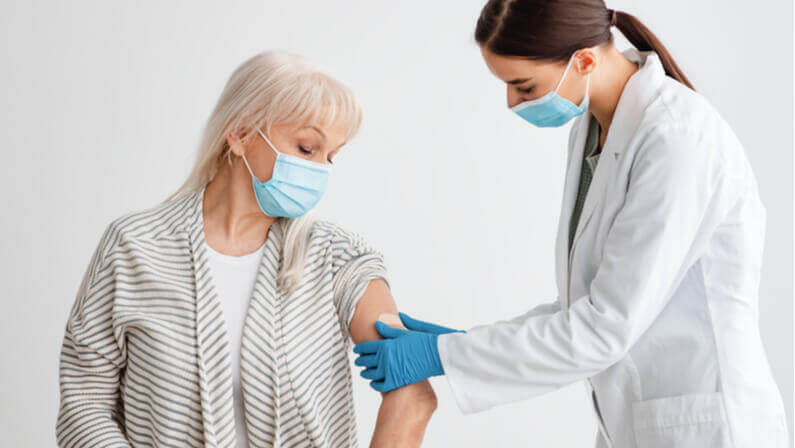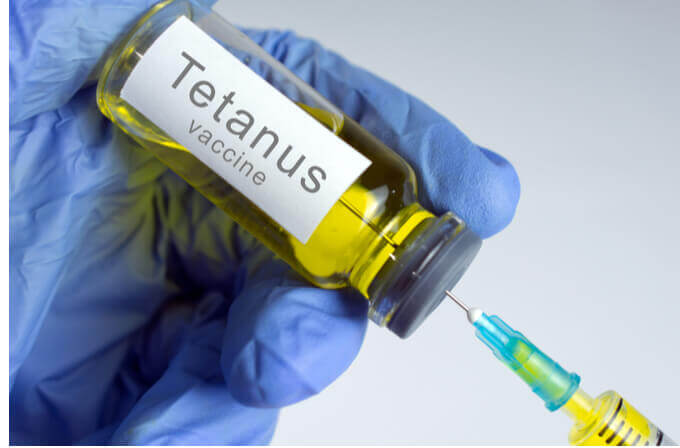Every year, there are 16 million cases of tetanus worldwide, and almost 300,000 die from the disease, data from the Centers for Disease Control and Prevention show. Tetanus is a serious bacterial infection that affects the nervous system and can cause muscle spasms and difficulty breathing.
While tetanus is rare in developed countries like the United States, it’s still important to be aware of the symptoms and get vaccinated if you aren’t up-to-date on your shots.
There are four different types of tetanus vaccine available: DTaP, Tdap, DT, and TT.
Here’s a quick overview of each one.
What is a Tetanus vaccine?

A tetanus vaccine is used to prevent a serious bacterial infection that affects a person’s nervous system and can cause muscle spasms and difficulty breathing.
A full course of the childhood vaccine series confers long-lasting immunity and is estimated to be 95% effective against severe tetanus.
What are the Four kinds of vaccines used against tetanus
- Diphtheria and tetanus (DT) vaccines – This vaccine is a combination of tetanus and Diptheria ( D ) vaccines, given as a shot.
- Diphtheria, tetanus, and pertussis (DTaP) vaccines – This vaccine contains lower concentrations of diphtheria and pertussis (whooping cough) antigens than the DT vaccine and is given as a shot. It also has higher concentrations of tetanus antigen than the DT vaccine.
- Tetanus and diphtheria (Td) vaccines – The Td vaccine is a booster that contains lower concentrations of tetanus and diphtheria antigens than the DTaP vaccine,
- Tetanus, diphtheria, and pertussis (Tdap) vaccines – The Tdap vaccine is a one-time booster that helps protect against three diseases: tetanus, diphtheria, and pertussis (whooping cough). It is essentially the same as the DTaP vaccine but with lower concentrations of diphtheria and pertussis antigens and a higher concentration of tetanus antigen.
Who should get the Tetanus Vaccine?

Vaccination is recommended for all people age seven and older who have never received a dose of the vaccine or completed the 3-dose primary series.
Adults should receive a single dose of the Tdap vaccine to replace one of the 10-year-Td booster shots, then get a Td booster shot every ten years.
People with the following conditions should receive the Tdap vaccine in place of one of their Td boosters:
- Closed wounds contaminated with dirt, especially puncture wounds or wounds resulting from stepping on sharp objects.
- Recent tetanus or diphtheria infection.
- Wound with an object embedded.
- Burn injury.
- Old or deep puncture wounds, especially those sustained in a dirty environment.
- Compromised immune system (for example, lymphoma, leukemia, HIV/AIDS).
- A handicap that makes it difficult for you to avoid stepping on sharp objects or to clean injuries properly.
- Chronic illnesses that affect your ability to heal, such as diabetes and severe kidney disease.
- Accidental exposure to tetanus-prone wounds (for example, stepping on a nail).
All adults should receive a single dose of the Tdap vaccine to protect against pertussis if they have never received a dose or if they have not received one in the last ten years.
Who should not get the Tetanus Vaccine?
Anyone who had a life-threatening allergic reaction to a previous dose of the vaccine should not get another.
Tell your doctor if you have any severe allergies.
People who recently received a “live” vaccine (for example, the nasal flu vaccine) should not get the tetanus-diphtheria vaccine until after the live vaccine has fully taken effect.
Where to get a tetanus shot?

You can get a tetanus shot from your doctor or, in some cases, from an after-hours clinic.
How long does a tetanus shot last?
- A vaccine is given during childhood usually confers immunity within 7 to 10 years.
- The Td booster usually confers immunity within ten years.
- Within seven years, a Tdap vaccine confers immunity against tetanus, diphtheria, and pertussis.
A tetanus booster shot is needed every ten years following the last dose of the tetanus vaccine.
Tetanus Symptoms

The bacterium Clostridium tetani cause tetanus. They can enter your body through cuts or puncture wounds, but they can also happen when you can’t clean a wound thoroughly.
Symptoms of tetanus include:
- rigid muscles
- difficulty swallowing
- trouble breathing or shortness of breath. The muscles in the jaw may become so stiff that you can’t open your mouth to eat or drink.
- involuntary muscle spasms or tightening of muscles. A condition called lockjaw (trismus). Spasms may occur in your stomach, arms, or legs.
- increased sweating
- fever
Tetanus Shot Side Effects and Risks

Most people have no side effects from a tetanus shot. If side effects occur, they usually last for 1-2 days.
They may include:
- pain, redness, or swelling at the injection site
- aches
- mild allergic reaction
- hives
- difficulty breathing
- hoarseness or wheezing.
- fever.
- painful joints for a few days after getting the shot are possible.
There is a very small risk of serious complications, including severe allergic reactions or uncontrolled muscle movements after getting the vaccine.
The benefits of getting the vaccine outweigh the risk of side effects.
How can I prevent tetanus?

The best way to prevent tetanus is by being vaccinated against it. Call your medical provider now for a vaccine schedule.
When you go to your doctor for a tetanus vaccine, be sure to tell him about any allergies you have.
Tdap and Td vaccines can be given at the same time as other vaccines during a single visit to the doctor.
When to seek help?

Call medical attention right away if you or someone in your family has a severe allergy to any component of the vaccine, especially if it causes trouble breathing.
If you have a lot of muscle pain or stiffness after its injection, this is called post-vaccination myalgia. You may not need any treatment, but it can be annoying.
Need Medical Advice?

Rare, minor, and quickly disappearing side effects of a tetanus injection are the norm. There is a widespread belief that the risks of side effects are far less than the dangers of contracting diseases like tetanus or diphtheria.
Although this is not a regular occurrence, some people may experience severe responses to vaccinations and should avoid them. In most circumstances, the tetanus vaccine is a safe and efficient method of preventing tetanus and other potentially deadly infections.
If you are in Kingwood, Texas, and need to know more information about tetanus shots and which one you are needing to get, contact Kingwood Emergency Room to schedule an appointment today.




